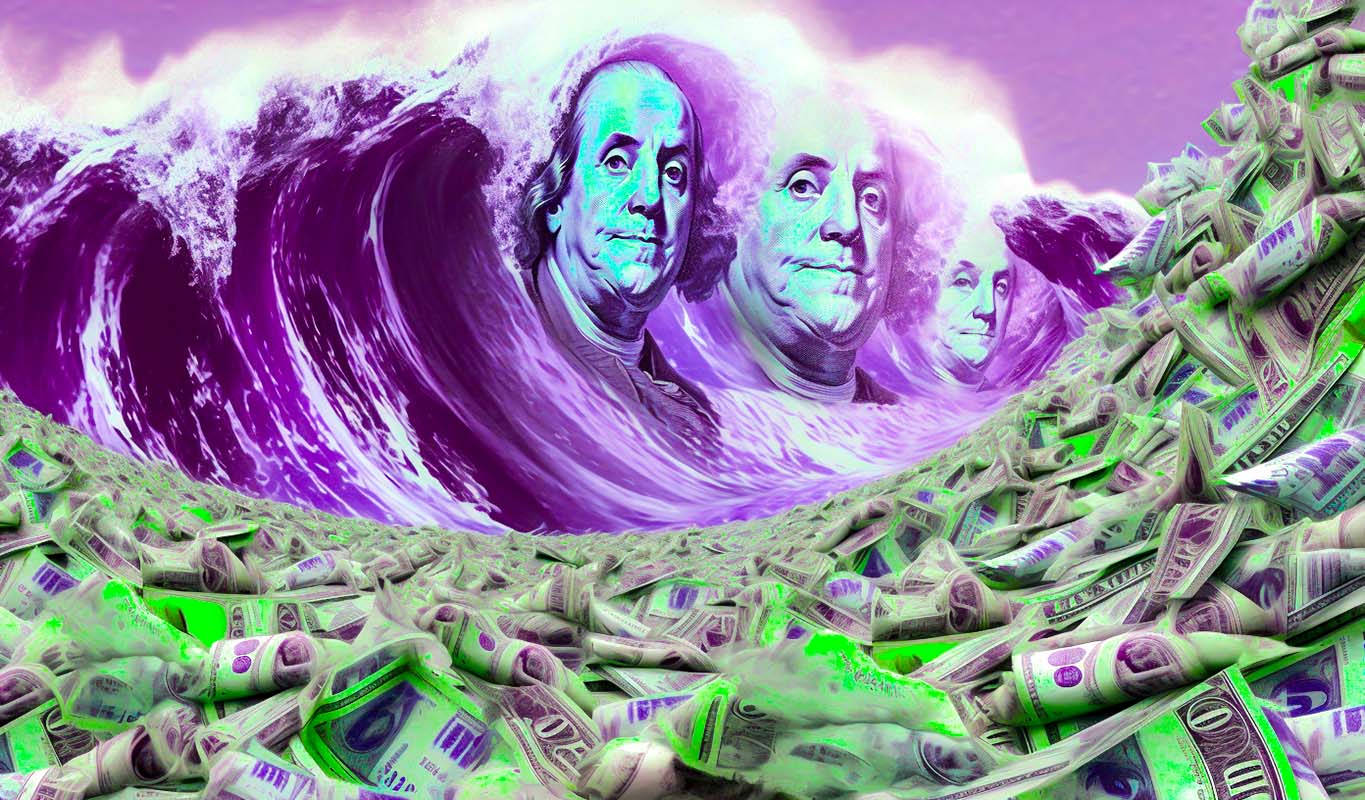Cleveland Federal Reserve President Loretta Mester stated that the recent inflation data does not change her view that inflation will gradually decrease to the Fed's 2% target, and emphasized that the focus this year will be on risk management and achieving balance between the dual mandate goals of price stability and maximum employment.
Car insurance rates have seen a significant increase, rising by 1.4% in January and nearly 21% over the past year due to higher repair costs and increased risk, leading to concerns that insurers are taking advantage of economic uncertainty to raise prices.

The Federal Reserve's goal of reaching its 2% inflation target has encountered a setback as recent inflation data shows that prices jumped 0.4% and are 2.8% higher than a year ago, which suggests that interest rate cuts are unlikely to happen in the near future.

Oklahoma, Ohio, Tennessee, Iowa, and the District of Columbia experienced the highest increase in unemployment filings, with Oklahoma leading at 1,802 claims in the week ending February 17, while overall US jobless claims rose to 215,000 for the week ending February 24, surpassing economist expectations.

The Federal Reserve's key inflation gauge, Personal Consumption Expenditures (PCE), rose in January, prompting speculation about when the Fed will start cutting rates and emphasizing the need for the committee to determine the appropriate timing for policy rate adjustments.

Michigan State Police found a woman who had been missing for almost seven years after hearing screams and crying coming from a motel room.

A Nigerian woman struggling to feed her family of nine during the country's economic crisis receives an outpouring of support after sharing her story, with strangers bringing food and money to her home.

Chicago Federal Reserve Bank President Austan Goolsbee believes that last year's improvements in the supply of goods and labor will lead to further declines in U.S. inflation this year, signaling his support for interest-rate cuts in the future.

Senate Democrats have introduced the Shrinkflation Prevention Act of 2024, which aims to address the downsizing of products, known as shrinkflation, by prohibiting manufacturers from engaging in this practice and authorizing civil actions against corporations.

The former chief economist of the IMF warns about the US government's increasing debt, stating that it could trigger the next global financial crisis.

Mortgage rates have risen for the fourth consecutive week, dampening the housing market with higher rates and elevated home prices.

The core Personal Consumer Expenditures (PCE) index, which excludes food and energy, increased 2.8% in January, the lowest annual increase since March 2021, leading experts to believe that the US is approaching the target inflation rate and may see a rate cut by mid-year.
The average long-term US mortgage rate has risen for the fourth consecutive week, reaching 6.94%, which could be a setback for prospective homebuyers during the spring homebuying season.

Mortgage rates have risen for the fourth consecutive week, reaching a two-month high and nearing 7%, causing a slowdown in homebuyer activity as the peak homebuying season begins and affordability decreases.

Despite predictions of falling credit card interest rates in 2024, many consumers continue to struggle with increasing credit card balances, with the total credit card debt in the U.S. reaching $1.08 trillion in 2023, according to a Federal Reserve Bank of New York report.

Americans need a net worth of at least $5.8 million to be in the top 1% of wealth, while Monaco's cutoff is nearly $12.9 million, according to the 2024 Wealth Report by Knight Frank, which also projected a 28% increase in the number of wealthy people globally in the next five years.
The Federal Reserve's commitment to intervene and support the economy through policies like the Bank Term Funding Program (BTFP) suggests that a recession and market collapse are unlikely, according to economist Alex Krüger. The presence of the 'Fed put' indicates that if the economy starts to falter, the Fed will step in to prevent a major decline. Additionally, Krüger believes that central banks will eventually adopt Bitcoin as a reserve asset alongside gold.

Traders believe that the recent increase in US inflation is not likely to change the Federal Reserve's plans for an interest rate cut, as policymakers are expecting some fluctuations in the inflation rate and are looking for more evidence before making a decision.

The Chicago Business Barometer, also known as the Chicago PMI, declined in February to 44, below expectations and indicating continued contraction in the manufacturing sector.

The Dow drifts lower as stocks trim gains after the release of the January PCE inflation data.

Despite entering into a recession, both Gen Z and Baby Boomers in the UK are optimistic about the country's economy, with a third of 18-24 year olds and over 65s having confidence in the UK's ability to bounce back over the next five years, while Gen Z is driven by a positive outlook due to salary increases and Baby Boomers’ optimism is linked to their experience with previous economic hardships and workplace disruptions. Additionally, Gen Z is increasingly turning to entrepreneurship as a response to the current economic and job market conditions.

Billionaire Kyle Bass complains about the high prices of room service at a New York City hotel, blaming President Biden and inflation, but fails to acknowledge that these prices are standard at luxury hotels.

Home insurance costs have surged 36% in the past year, alongside rising living costs and inflation, with combined policies seeing the largest increase.

Ethiopia's Prime Minister Abiy Ahmed has ambitious plans to modernize and transform the country, but internal conflicts, economic challenges, and a lack of foreign investment are hindering progress.

Despite an increase in Americans applying for jobless benefits, layoffs remain historically low, although there have been recent job cuts in technology and media companies.

The Dow opens higher as inflation data meets expectations, specifically the PCE inflation for January.

Texas, with its strong economy and high GDP, is home to many thriving cities, but there are also several cities experiencing population decline, including Fort Worth, Lubbock, Plano, Garland, El Paso, and Houston.

The second estimate for GDP in Q4 of 2023 was revised slightly downward, but still showed strong growth, which is expected to delay interest rate cuts and keep mortgage rates from declining in the housing market.

The G20 is discussing the implementation of a global minimum tax on billionaires to counter tax avoidance and ensure that the super-rich pay their fair share, following the success of a global minimum tax for multinational corporations. This proposal is being promoted by Brazil's G20 presidency and has garnered support from France.

The middle class is thriving and experiencing active growth in the population across 50 cities in the United States, with Florida cities Hialeah, Miami, and Palm Bay seeing significant middle-class growth.

India's gross domestic product (GDP) expanded by 8.4% in the October to December quarter, surpassing expectations, mainly due to strong growth in manufacturing and construction, leading the government to upgrade its GDP growth forecast for the year ending in March.

The yen rose to a two-week high on hawkish Bank of Japan signals, while bitcoin surged close to record levels, but the focus for U.S. markets is the crucial PCE inflation data set to be released today.

Hong Kong's days as a global deal-making hub are numbered as Western banks, expats, and foreign capital flee the region due to Beijing's authoritarian grip and the chilling of free speech and capitalism, leading to an economic decline and a shift away from Western values.

Russia's economic resilience against sanctions has frustrated the West, but economist Elina Ribakova argues that trying to isolate a large and globally-integrated economy like Russia's is costly and unattainable. The lessons learned from sanctioning Russia could be valuable in future situations, such as potential trade restrictions against China.
The cost of car insurance in the US has risen 20.6% over the past year, the largest increase since 1976, due to the higher prices of vehicles and repairs.

Despite economic recession, population decline, and political stagnation, Japan remains remarkably stable and cohesive, with low unemployment, affordable living conditions, and a sense of contentment among its people.

Despite consumer spending preventing a recession in the US economy, experts warn that consumers' increasing credit card debt and diminishing savings will eventually lead to a downturn.
Sri Lanka's inflation eases in February due to a stronger currency and slower food price gains, providing some relief to the central bank.

India's north-south divide, fueled by competing trends of development and identity politics, is a defining issue in the upcoming election and could potentially create a constitutional crisis and fracture the country's single market. However, resolving this divide could lead to a more moderate approach to identity politics and have positive implications for India's prospects.

Almost 500 staff will be made redundant as administrators close 75 stores at The Body Shop, with 116 stores remaining open.

US Backs Pakistan's Cooperation with IMF for Economic Stability as PTI Seeks Audit of 2023 Elections
The United States is urging Pakistan to work with the International Monetary Fund (IMF) and other international financial institutions for macroeconomic reforms in order to achieve economic stability in the country. This comes after a letter from Pakistan Tehreek-e-Insaf (PTI) to the IMF requesting an audit of the 2024 elections for political stability.

Democracy experienced setbacks worldwide in 2023, with violence and manipulation affecting elections in many countries, leading to a decline in political rights and civil liberties in 52 countries, according to Freedom House's annual report. Two notable changes were Ecuador being downgraded to partly free and Thailand being upgraded to partly free.

China's economy is facing challenges, particularly in the real estate sector, but other industries such as tourism, electric vehicles, lithium-ion batteries, and solar cells are thriving and driving growth in the country. However, these new industries are not yet able to replace the economic impact of the real estate sector.
China's small businesses are facing significant challenges, with shrinking market demand and payment delays compounding their issues, according to a survey by Peking University. The survey found that 71% of small businesses have outstanding receivables, with construction and manufacturing industries being the most affected. The average value of arrears reached 103,000 yuan, causing cash flow issues and disruptions in the supply chain. The report called for supportive measures to address these problems and boost consumer confidence.

Rent prices in the United States have been rising significantly since the end of the COVID-19 pandemic, with shortages in supply and long-term lease agreements contributing to the increases, leading experts to believe that the trend will continue.

The Congressional funding deal reached will prevent a government shutdown and maintain services critical for the American public, while Treasury Secretary Janet Yellen emphasizes the need to avoid threats to the strong US economy and urges Congress to approve aid for Ukraine.

Billionaire investor Kyle Bass faced ridicule on social media after complaining to Treasury Secretary Janet Yellen and the Federal Reserve about his $85 room service bill, with many pointing out that high prices for room service in luxury hotels have always been the norm.

The Federal Reserve may delay easing monetary policy until mid-year as inflation is expected to rise, prompting concerns about broader pricing pressures and the need for more time to assess the situation before considering rate cuts.

The Personal Consumption Expenditures (PCE) index, commentary from several Fed officials, and earnings reports from companies like Bath & Body Works, Dell, and Best Buy are the major events to watch for on Thursday, February 29.
Former Treasury Secretary Larry Summers argues that the consumer price index may underestimate the impact of rising interest rates on Americans' cost of living, potentially explaining why many people feel economic pain despite positive government statistics.
